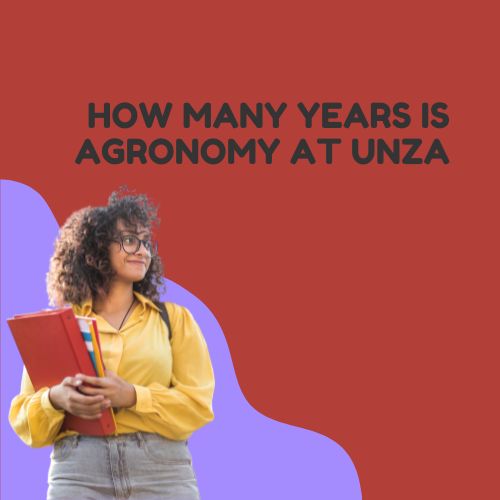Here’s a comprehensive post about the scope and duration of studying Agronomy in the University of Zambia (UNZA):
What is the duration of the whole Agronomy Program at UNZA? This is the answer to your question.
.At the UNZA, the study of agronomy is included as the first target for attaining the Bachelor of Science in Agricultural Sciences. To the would-be candidates, the problem that many persons have is: How many years is this program in the United States?
Period Studied Towards an Agronomy Program at UNZA
Bachelor of Science in Agricultural Sciences with emphasis on Agronomy takes on average students four years to be completed on full time basis. This duration is common for most of the degree programs in the country including agricultural science as it is the case in the world.
The program is divided up into two semesters per academic year for a total of eight semester sessions. Throughout those four working years, students partake in classroom education, field observations, laboratory work, and student research projects.
Annual Program Breakdown
Here’s an overview of the syllabus by the thread of the program year wise –
First Year: Foundation Courses
In the first year, the intention is to develop a strong understanding of the basic sciences along with the concepts of agriculture. This includes:
-Biology
-Chemistry
-Physics
-Mathematics
-Introduction to Agriculture and Environmental Sciences
These courses serve as a source for appreciating the biological principles in which Agronomy is embedded.
Second Year: Core Agricultural Sciences
In the second year, students continue their circle although at a deeper level by combining their understanding of the proposed sciences with respect to agriculture. Among the core subjects are:
-Soil Science
-Crop Science
Agricultural Economics
Plant Physiology
Principles of Agronomy
These courses enable students to acquire a broad background as a preparation for more advanced agronomic courses.
Third Year: Specialized Agronomic Studies
The third year is an introductory year to specialized Agronomy where topics such as the following would pertain:
-Crop Production Techniques
Soil Fertility and Management
Pest and Disease Management
Agricultural Meteorology
Irrigation and Water Management
More of practical studies whereby students are taken in the fields and see things as they are in agriculture.
Fourth Year: Research and Practical Application
The last year of the undergraduate program has strong emphasis on conducting research, putting skills into practice and further studies. Such include:
Conducting research in form of a project work or dissertation aimed at solving a specific problem in Agronomy.
- Cultivation of important areas such as environmental friendly agriculture, enhancement of seeds, and farming based on technology.
- Attachment or work experience in agricultural institutions or agricultural places.
The last part of the course is that it provides the student with common understanding of the agronomic principles and practical knowhow of the44 principles.
What Other Areas Does the Program Have in It?
- Industrial Attachment: UNZA also emphasizes practicum. Students visit agricultural institutions, research centers or commercial farms for practical exposure.
- Research Projects: Every student is required to work on a research project of their choice that is relevant to agriculture. This enables them to practice as researchers, politicians, or farmers.
Elements Contributing to The Time Taken In The Program
Normally the average period is 4 years but this time period can vary due to several factors:
Part-Time Study: For those students who cannot engage fully with studies the duration provided may increase.
Adjustment Problems: When students cannot meet the academic expectations, they may be required to work extra hours to pass the subjects.
Socio-Political Events: Causes like a situation owing to personal issues or a situation arising due to a country may at times increase the duration.
Job Opportunities During and After Studies
All the students that study their degree in Agronomy at UNZA have numerous career opportunities to choose from:
– Crop Consultancy
– Soil and Water Conservation
– Agricultural Research and Development
– Farm Management
– Teaching and extension services
– Agribusiness
Nationally, the graduates are expected to participate actively in the agricultural production of Zambia and the security of sustenance for the rest of the world.
Final Thoughts
The four years of studying Agronomy at UNZA encompass all the necessary topics to prepare and equip the students in responding to Agricultural issues. Starting from the basic theoretical part, going through practical parts and doing research work focusing on farming, there is nothing a graduate misses to allow him/her to be successful in the agricultural field.
For students looking forward to getting a degree in this field at UNZA – Getting into the Agronomy program is a great way to assist building sound practices that promote good farming and food security.
This article covers an important aspect about the Agronomy program, its duration as well as the structure while taking studies at UNZA. Feel free to reach out if you require any changes or additional information
How Many Years is Agronomy in Zambia? Let Me Dive Deeper with You
Period of Agronomy Study in Zambia
Theov: Thomas- Davis: When looking at Agronomy studies in terms of the various levels of study, I can say that the length of program offered in Zambia can vary. Below is a synopsis of the paths that can be taken academically.
Bachelor’s Degree in Agronomy:
- Time-Based: Follows a 4year full-time program.
- In most Zambian universities this is the norm for Bachelor’s in agricultural sciences.
Diploma in Agronomy:
- Time-Based: 2 years and may go up to 3 years, depending on the institution.
- It is shorter, as it is focused on theory that can be applied directly in the field of Agriculture.
Master’s Degree in Agronomy:
- Time-Based: It is a two year full time program.
- Master’s Degree then widens up to concentrate on research to advanced levels in the field of agronomy.
PhD in Agronomy:
- Time-Based: A student may take anywhere between 3 to 5 years, which will be determined by the area of specialization.
- The doctoral studies are far more research oriented and aim to develop professionals in the various branches of Agronomy.
The centers of this paper is largely concentrated on Bachelor’s Degree in Agronomy as most students seeking to further their education in this particular field will begin from here.
Details of the Bachelor’s Degree in Agronomy
Program Arrangement
The Bachelor of Science in Agronomy in Zambian institutions of higher learning takes a period of four years and this is broken down into 8 semesters.
In the program, emphasis is laid on competencies that should be in the student by the end of a course, which includes theoretical, practical and research skills.
Breakdown By Year
1.First Year: Foundation Courses
Students start with economical courses which lay the scientific foundation of their agricultural studies. Some of the Economics subjects includes:
- Biology 1
- Agriculture 1
- Mathematics for Agricultural students
- Chemistry for Agriculture
- Intro to Environmental Studies
These subjects offer basic knowledge required for other more focused agricultural courses in the future.
2. Second Year: Primary courses in Agronomy
The second year covers core areas in agronomy and agricultural courses coverage which are as follows:
- Soils
- Crops
- Crop Biology
- Farm Management
- Basics of Agricultural Mechanization
The year gives the principles and practices of crops and soils to be farmed in the future.
Third Year: Practical Agronomy and Field Work
In third year, advanced studies begin with practical sessions. Subjects taken include:
- Enhancement of Soil Resources in Agriculture
- Strategies for Crop Cultivation
- Management of Crop Pests and Diseases
- Farming and Environment
- Management of Water Resources in Agriculture
From this point onwards, learners are expected to do more practical work, as they learn farming concepts, undertake attachment and conduct agriculture experiments.
Fourth Year: Research and Implementation Integrating Experiences
Final year deals with research and application of basics of agronomy concepts.
Programs offered include:
- The student’s undertaking of a research project or dissertation.
- Participating and learning to understand the concepts of sustainable agriculture and precision farming.
- Completing a field attachment or an internship at an agricultural company, research center or a farm.
Students leave knowledgeable about the aspects of agronomy that are essential to Zambian agriculture.
Agronomy Colleges in Zambia
In Zambia, a number of colleges offer Agronomy programs. Some of the universities and colleges that stand out include:
University of Zambia (UNZA)
- Period of Study: 4 years.
Mulungushi University
- The college provides a focus on agriculture programs with an emphasis on agronomy.
zambia College of Agriculture
- Worth noting, the institution focuses on programs in Agronomy especially diplomas.
Copperbelt University (CBU)
- The University covers Agronomy with courses provided at postgraduate and undergraduate levels.
- Colleges of Natural Resources Development (NRDC)
- The college offers a diploma and provides a lot of practical agricultural training.
Every institution is designed to focus on the specific needs of Zambia’s agriculture sector and offer a balance between theory and practice.
What Is The Value Of Studying Agronomy In Zambia?
Considering that agriculture is the most favored form of earning a living for many in Zambia, Agronomy is in the right place to make an impact.
Here are a few reasons as to why it is worthwhile and worthwhile to do Agronomy in Zambia:
Food Production Problem:
A rising population increases the need of agronomists as well as in the pest control management, food production and crop management.
Environmental Sustainability:
Their role as agronomists encompasses sustainable agriculture that reduces the stress placed upon the environment while restoring soil and biodiversity.
Working Fields:
Particular working fields that agronomy graduates can engage in include but not limited to.
- Agricultural consulting.
- Research Development Development.
- Soil and water management.
- Agricultural operations.
- Teaching and extension.
Agronomy is not only an agriculture led economic landscape in Zambia but also quite importantly food security and environmental issues on a global scale are very very important and pressing matters.
Lasses and Gains in the Course of Agronomy
While there are multiple merits to studying agronomy in Zambia, considerate of the lack of infrastructure and financial resources aspects there are other challenges that both students and professional might face:
- Poor access to better equipment for agriculture.
- Global changing climate affecting the farming system.
- Underfunded research projects focusing on agriculture.
But then owing to these issues the innovations, researches and policy frameworks to uplift the agriculture in Zambia might flourish.
In Zambia, agronomy is not only looked up to as a perfect degree course but the entire process of obtaining a Bachelors is an beautiful experience that compliments a four year period.
It provides students with relevant understanding and capabilities to deal with major agriculture related issues, strengthen global food supply, and work in promoting progress for people and the environment.
Should your goals includes employment as a crop advisor or soil scientist or a farm manager or even an agricultural researcher, then Agronomy is the subject you should choose as it has great career opportunities. And with key agricultural educational institutes like UNZA, CBU and NRDC, Zambia has the potential to develop the optimal conditions needed to prepare this new generation of professionals who will stand at the forefront of the future of agriculture in the country.
how many years is agronomy at unza
Here’s a comprehensive post about the scope and duration of studying Agronomy in the University…
What is medical terminology
Such meaning engages the human body, its diseases, various procedures, and possible treatments. In the…
What is the future of Pakistan economy in 2050
Pakistan’s Economic Prospects in 205 Future prospects appear to be both promising and somewhat daunting…
Main aim of science is to create knowledge which is based on three parameters: observation,…
What is the main focus of science and technology
Science and Technology: Their Definition To begin with, science and technology go hand in hand…
What is the scope of BS Marine Science in Pakistan
The Scope of BS Marine Science in Pakistan Marine Science is a global body of…






